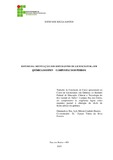Estudo da motivação dos estudantes de licenciatura em química do IFRN - Campus Pau dos Ferros

Visualizar/
Data
2023-04-26Autor
Santos, Estefane Souza
http://lattes.cnpq.br/4396023083967444
Metadado
Mostrar registro completoResumo
Motivation is understood as a determining factor in the effectiveness of the student's learning process, on the other hand, its absence is one of the indicators that can lead to problems, from adaptation to staying at the university, and is also one of the factors responsible for dropout . Therefore, there is a need to develop studies that focus on students in the permanence process, considering their socioeconomic and psychological issues. The objective of the present work is to investigate the motivational profile of the students of the Degree in Chemistry at the IFRN Campus Pau dos Ferros through the Academic Motivation Scale (EMA). To this end, a survey was carried out on the socioeconomic and motivational profile of these students, through a questionnaire organized into three sections: the first, consisting of the Free and Informed Consent Form, the second, with the socioeconomic questionnaire and the third with the Scale of Academic Motivation (EMA) by theorists Guimarães and Bzuneck (2008). A total of 62 students (54.8% female and 45.2% male) with active enrollment in the Chemistry Degree course participated in the research. As a result, it was found that the representative group of students come mainly from public schools (98.4%), with an age range of 18 to 36 years and about 58.1% of students have an income of up to 1, 5 minimum wage. In motivational terms, it was observed that the majority public showed a strong tendency to Extrinsic Motivation by Integrated Regulation, which describes a self-determined behavior, whose actions are well directed and there is attribution of value in the activities carried out, consequently the students also presented an academic performance with an average equivalent to 71.28, indicating that the students had a good academic performance. In this way, the importance of studying motivation is understood, from the most personal aspects to the institutional aspects, given that, with this, it is possible to establish ways to overcome or mitigate the impacts of this problem.



